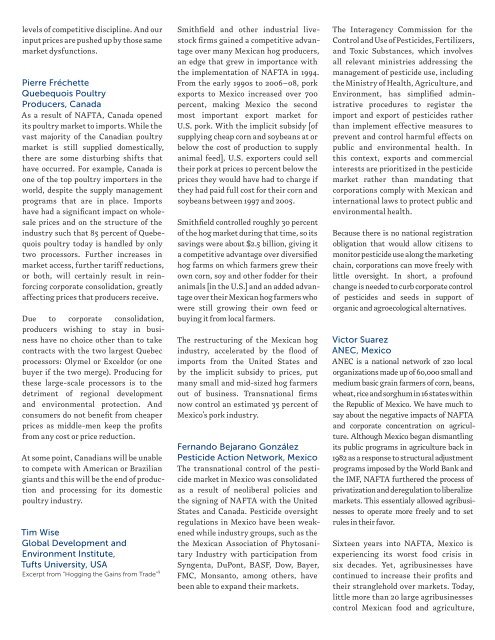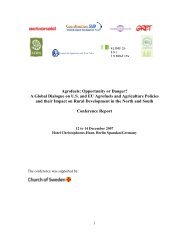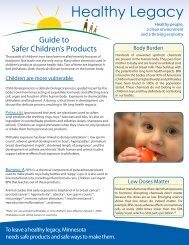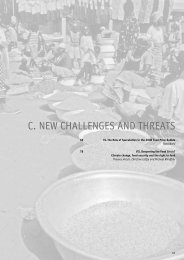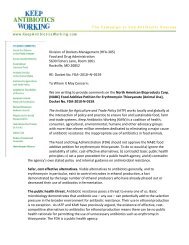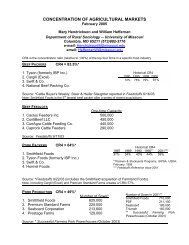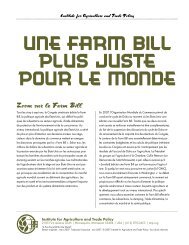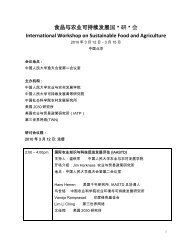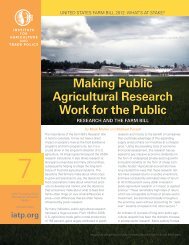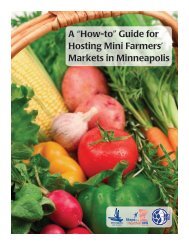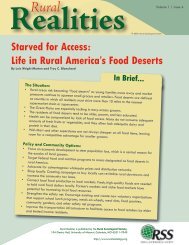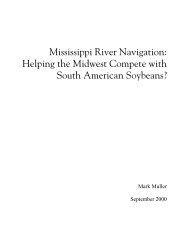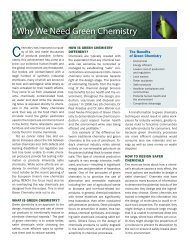NAFTA: Fueling Market Concentration in Agriculture - Institute for ...
NAFTA: Fueling Market Concentration in Agriculture - Institute for ...
NAFTA: Fueling Market Concentration in Agriculture - Institute for ...
Create successful ePaper yourself
Turn your PDF publications into a flip-book with our unique Google optimized e-Paper software.
levels of competitive discipl<strong>in</strong>e. And our<br />
<strong>in</strong>put prices are pushed up by those same<br />
market dysfunctions.<br />
Pierre Fréchette<br />
Quebequois Poultry<br />
Producers, Canada<br />
As a result of <strong>NAFTA</strong>, Canada opened<br />
its poultry market to imports. While the<br />
vast majority of the Canadian poultry<br />
market is still supplied domestically,<br />
there are some disturb<strong>in</strong>g shifts that<br />
have occurred. For example, Canada is<br />
one of the top poultry importers <strong>in</strong> the<br />
world, despite the supply management<br />
programs that are <strong>in</strong> place. Imports<br />
have had a significant impact on wholesale<br />
prices and on the structure of the<br />
<strong>in</strong>dustry such that 85 percent of Quebequois<br />
poultry today is handled by only<br />
two processors. Further <strong>in</strong>creases <strong>in</strong><br />
market access, further tariff reductions,<br />
or both, will certa<strong>in</strong>ly result <strong>in</strong> re<strong>in</strong><strong>for</strong>c<strong>in</strong>g<br />
corporate consolidation, greatly<br />
affect<strong>in</strong>g prices that producers receive.<br />
Due to corporate consolidation,<br />
producers wish<strong>in</strong>g to stay <strong>in</strong> bus<strong>in</strong>ess<br />
have no choice other than to take<br />
contracts with the two largest Quebec<br />
processors: Olymel or Exceldor (or one<br />
buyer if the two merge). Produc<strong>in</strong>g <strong>for</strong><br />
these large-scale processors is to the<br />
detriment of regional development<br />
and environmental protection. And<br />
consumers do not benefit from cheaper<br />
prices as middle-men keep the profits<br />
from any cost or price reduction.<br />
At some po<strong>in</strong>t, Canadians will be unable<br />
to compete with American or Brazilian<br />
giants and this will be the end of production<br />
and process<strong>in</strong>g <strong>for</strong> its domestic<br />
poultry <strong>in</strong>dustry.<br />
Tim Wise<br />
Global Development and<br />
Environment <strong>Institute</strong>,<br />
Tufts University, USA<br />
Excerpt from “Hogg<strong>in</strong>g the Ga<strong>in</strong>s from Trade” 9<br />
Smithfield and other <strong>in</strong>dustrial livestock<br />
firms ga<strong>in</strong>ed a competitive advantage<br />
over many Mexican hog producers,<br />
an edge that grew <strong>in</strong> importance with<br />
the implementation of <strong>NAFTA</strong> <strong>in</strong> 1994.<br />
From the early 1990s to 2006–08, pork<br />
exports to Mexico <strong>in</strong>creased over 700<br />
percent, mak<strong>in</strong>g Mexico the second<br />
most important export market <strong>for</strong><br />
U.S. pork. With the implicit subsidy [of<br />
supply<strong>in</strong>g cheap corn and soybeans at or<br />
below the cost of production to supply<br />
animal feed], U.S. exporters could sell<br />
their pork at prices 10 percent below the<br />
prices they would have had to charge if<br />
they had paid full cost <strong>for</strong> their corn and<br />
soybeans between 1997 and 2005.<br />
Smithfield controlled roughly 30 percent<br />
of the hog market dur<strong>in</strong>g that time, so its<br />
sav<strong>in</strong>gs were about $2.5 billion, giv<strong>in</strong>g it<br />
a competitive advantage over diversified<br />
hog farms on which farmers grew their<br />
own corn, soy and other fodder <strong>for</strong> their<br />
animals [<strong>in</strong> the U.S.] and an added advantage<br />
over their Mexican hog farmers who<br />
were still grow<strong>in</strong>g their own feed or<br />
buy<strong>in</strong>g it from local farmers.<br />
The restructur<strong>in</strong>g of the Mexican hog<br />
<strong>in</strong>dustry, accelerated by the flood of<br />
imports from the United States and<br />
by the implicit subsidy to prices, put<br />
many small and mid-sized hog farmers<br />
out of bus<strong>in</strong>ess. Transnational firms<br />
now control an estimated 35 percent of<br />
Mexico’s pork <strong>in</strong>dustry.<br />
Fernando Bejarano González<br />
Pesticide Action Network, Mexico<br />
The transnational control of the pesticide<br />
market <strong>in</strong> Mexico was consolidated<br />
as a result of neoliberal policies and<br />
the sign<strong>in</strong>g of <strong>NAFTA</strong> with the United<br />
States and Canada. Pesticide oversight<br />
regulations <strong>in</strong> Mexico have been weakened<br />
while <strong>in</strong>dustry groups, such as the<br />
the Mexican Association of Phytosanitary<br />
Industry with participation from<br />
Syngenta, DuPont, BASF, Dow, Bayer,<br />
FMC, Monsanto, among others, have<br />
been able to expand their markets.<br />
The Interagency Commission <strong>for</strong> the<br />
Control and Use of Pesticides, Fertilizers,<br />
and Toxic Substances, which <strong>in</strong>volves<br />
all relevant m<strong>in</strong>istries address<strong>in</strong>g the<br />
management of pesticide use, <strong>in</strong>clud<strong>in</strong>g<br />
the M<strong>in</strong>istry of Health, <strong>Agriculture</strong>, and<br />
Environment, has simplified adm<strong>in</strong>istrative<br />
procedures to register the<br />
import and export of pesticides rather<br />
than implement effective measures to<br />
prevent and control harmful effects on<br />
public and environmental health. In<br />
this context, exports and commercial<br />
<strong>in</strong>terests are prioritized <strong>in</strong> the pesticide<br />
market rather than mandat<strong>in</strong>g that<br />
corporations comply with Mexican and<br />
<strong>in</strong>ternational laws to protect public and<br />
environmental health.<br />
Because there is no national registration<br />
obligation that would allow citizens to<br />
monitor pesticide use along the market<strong>in</strong>g<br />
cha<strong>in</strong>, corporations can move freely with<br />
little oversight. In short, a profound<br />
change is needed to curb corporate control<br />
of pesticides and seeds <strong>in</strong> support of<br />
organic and agroecological alternatives.<br />
Victor Suarez<br />
ANEC, Mexico<br />
ANEC is a national network of 220 local<br />
organizations made up of 60,000 small and<br />
medium basic gra<strong>in</strong> farmers of corn, beans,<br />
wheat, rice and sorghum <strong>in</strong> 16 states with<strong>in</strong><br />
the Republic of Mexico. We have much to<br />
say about the negative impacts of <strong>NAFTA</strong><br />
and corporate concentration on agriculture.<br />
Although Mexico began dismantl<strong>in</strong>g<br />
its public programs <strong>in</strong> agriculture back <strong>in</strong><br />
1982 as a response to structural adjustment<br />
programs imposed by the World Bank and<br />
the IMF, <strong>NAFTA</strong> furthered the process of<br />
privatization and deregulation to liberalize<br />
markets. This essentialy allowed agribus<strong>in</strong>esses<br />
to operate more freely and to set<br />
rules <strong>in</strong> their favor.<br />
Sixteen years <strong>in</strong>to <strong>NAFTA</strong>, Mexico is<br />
experienc<strong>in</strong>g its worst food crisis <strong>in</strong><br />
six decades. Yet, agribus<strong>in</strong>esses have<br />
cont<strong>in</strong>ued to <strong>in</strong>crease their profits and<br />
their stranglehold over markets. Today,<br />
little more than 20 large agribus<strong>in</strong>esses<br />
control Mexican food and agriculture,


